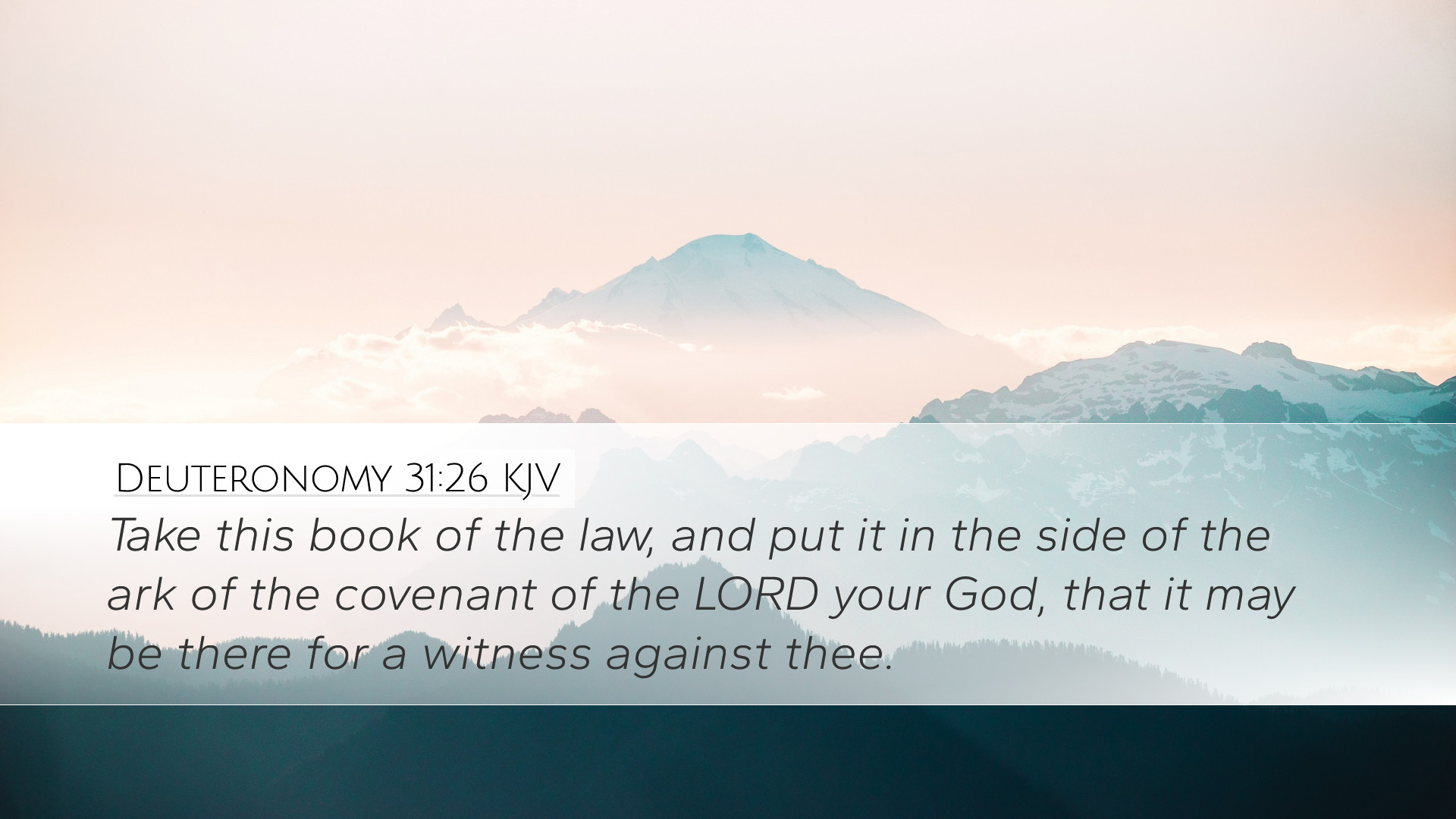Commentary on Deuteronomy 31:26
Bible Verse: "Take this book of the law, and put it in the side of the ark of the covenant of the LORD your God, that it may be there for a witness against thee."
Introduction
The verse in Deuteronomy 31:26 marks a significant moment in Israel's history. As Moses prepares to conclude his leadership and hand over authority to Joshua, he instructs the Israelites to maintain a constant reference to the Law. This act of placing the book of the law near the ark of the covenant serves multiple purposes, foremost among them being a testament to God's covenant with His people.
Historical Context
This directive comes in a context where the Israelites are poised to enter the Promised Land. Moses, aware of the challenges ahead, emphasizes the importance of divine instruction, urging the people to remember their obligations under the covenant. It reflects the larger narrative of Deuteronomy, which is a recapitulation of the law given at Sinai and a call to fidelity from the new generation of Israelites.
Significance of the Ark
The ark of the covenant symbolizes God's presence among His people. By placing the book of the law beside the ark, Moses signifies that the law is an extension of God's will and character. It serves as a physical witness, reminding the Israelites not only of their covenant responsibilities but also of God's faithfulness and holiness.
Theological Insights
- The Authority of the Law: Albert Barnes highlights that the law is not merely a set of rules; it is the very expression of God's holiness and righteousness. The placement of the law next to the ark implies that God's authority and His word are inseparably linked.
- The Role of Witness: Adam Clarke emphasizes the law's function as a witness against the people, foretelling future failures. This perspective aligns with the broader narrative of Israel's history, where their disobedience leads to consequences that they had been warned of through the law.
- Reminder of Covenant: Matthew Henry remarks that this act serves as a continual reminder of the covenant relationship. The law must be upheld, and failing to do so means breaking the covenant, which carries dire spiritual and social repercussions.
Spiritual Applications
The command to place the law near the ark speaks profoundly to contemporary believers. It challenges modern Christians to consider how they hold God's Word in their lives.
- Reliance on Scripture: Just as the Israelites were to rely on the law for guidance, Christians today are called to anchor their lives in Scripture, allowing it to guide decisions, shape character, and foster growth in holiness.
- Accountability: The concept of the law acting as a witness implies accountability. Believers are encouraged to reflect on their own lives in light of Scripture, recognizing that they will ultimately answer to God for their actions.
- Continuity of God's Promises: The placement of the law signifies God's enduring promises. As New Testament believers, it reminds us that God's word is still living and active, fulfilling promises made long ago through Christ.
Practical Considerations for Ministry
This verse offers significant insights for pastoral practice and theological education. Pastors and leaders can draw from this scripture to advocate for a return to the foundational truths of Scripture within their congregations.
- Teaching the Law: There is an imperative to teach both the Old and New Testaments comprehensively, illustrating the coherence of God’s word and its authority in guiding righteous living.
- Encouraging Memorization: Churches should encourage members to memorize Scripture as a means of internalizing the law, ensuring that they have the Word in their hearts as a guide through life's complexities.
- Creating a Culture of Accountability: In fostering an environment where believers feel accountable to one another and to God's law, churches can promote spiritual growth and resilience against sin.
Conclusion
In Deuteronomy 31:26, we find not simply an ancient instruction but a timeless principle vital for all generations. The connection between the law and the ark of the covenant reminds us of the unchanging nature of God’s word and its relevance to our lives today. As we engage with this Scripture, may we draw strength from its witness and commit ourselves to honoring God's commands, standing as reflections of His truth in a world that desperately needs it.


